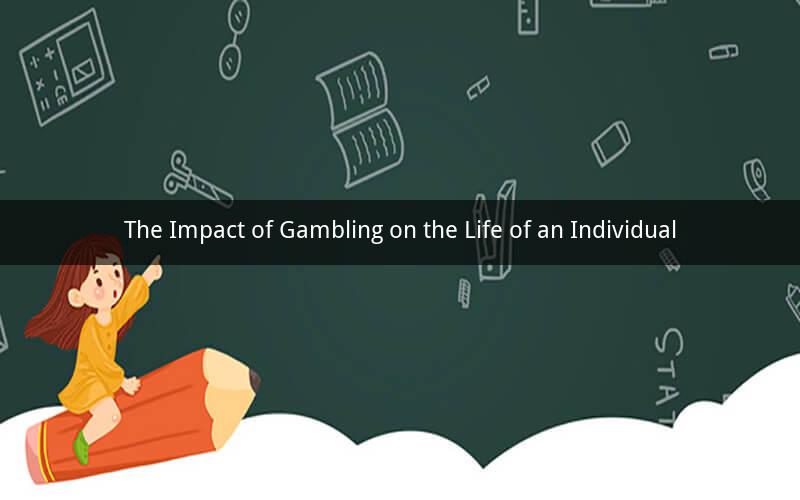
Gambling, an activity that has been around for centuries, continues to captivate the attention of millions. While it can be a source of excitement and entertainment, it can also have severe consequences on the life of a gambler. In this article, we will explore how gambling affects the life of an individual, including its impact on their financial, emotional, and social well-being.
Financial Consequences
One of the most immediate and significant impacts of gambling on a person's life is the financial consequences.Gambling can lead to severe financial problems, including debt, bankruptcy, and loss of assets. Many gamblers become obsessed with the idea of winning big, leading them to spend beyond their means, borrow money, and even steal to finance their gambling habits.
Debt is a common problem among gamblers. As they continue to lose money, they may turn to credit cards, loans, and other forms of debt to fund their gambling activities. Eventually, the debt becomes overwhelming, and gamblers may find themselves in a cycle of borrowing and spending, unable to break free.
Bankruptcy is another potential consequence of gambling addiction. When a person's debts become too much to handle, they may file for bankruptcy to get a fresh start. However, bankruptcy can have long-lasting effects on a person's credit score and financial future.
Loss of assets is also a common problem among gamblers. They may sell off valuable possessions, such as homes, cars, and jewelry, to finance their gambling habits. In some cases, they may even resort to stealing to support their addiction.
Emotional Consequences
Gambling can also have significant emotional consequences for individuals. Many gamblers experience feelings of guilt, shame, and despair as they struggle with their addiction. They may feel as though they have let themselves and their loved ones down, leading to increased stress and anxiety.
Depression is another common emotional consequence of gambling addiction. Gamblers who are struggling with their addiction may experience feelings of hopelessness and sadness, leading to a decline in their overall well-being.
Gamblers may also experience mood swings, irritability, and aggression. These emotional changes can affect their relationships with family, friends, and co-workers, leading to increased conflict and isolation.
Social Consequences
Gambling can also have significant social consequences for individuals. Gamblers may find themselves spending less time with family and friends, as they become increasingly absorbed in their addiction. This can lead to strained relationships and even the loss of loved ones.
Gamblers may also experience job-related problems due to their addiction. They may be late for work, miss deadlines, or engage in other behaviors that could lead to termination. In some cases, gamblers may even steal from their employers to fund their gambling habits.
Additionally, gamblers may experience legal problems due to their addiction. They may be arrested for theft, fraud, or other crimes related to their gambling habits. This can lead to fines, jail time, and a criminal record that can affect their future employment and social standing.
Treatment and Support
If you or someone you know is struggling with a gambling addiction, it is important to seek help. There are many resources available, including counseling, support groups, and treatment centers.
Counseling can help individuals understand the root causes of their addiction and develop strategies for managing their gambling habits. Support groups, such as Gamblers Anonymous, can provide a sense of community and support for individuals struggling with addiction.
Treatment centers can offer comprehensive care, including detoxification, therapy, and support services. These programs can help individuals break free from their addiction and develop the skills they need to maintain a healthy, productive life.
In conclusion, gambling can have a profound impact on the life of an individual, affecting their financial, emotional, and social well-being. It is important to recognize the signs of a gambling addiction and seek help before the consequences become too severe.
Questions and Answers:
1. How can gambling lead to financial problems?
Gambling can lead to financial problems when individuals spend beyond their means, borrow money, and even steal to finance their gambling habits. This can result in debt, bankruptcy, and loss of assets.
2. What emotional consequences can gambling addiction have?
Gambling addiction can lead to emotional consequences such as guilt, shame, despair, depression, mood swings, irritability, and aggression. These emotional changes can affect relationships and overall well-being.
3. How can gambling affect social relationships?
Gambling can affect social relationships by causing individuals to spend less time with family and friends, leading to strained relationships and even the loss of loved ones. It can also lead to job-related problems and legal issues, further impacting social standing.
4. What resources are available for individuals struggling with gambling addiction?
Individuals struggling with gambling addiction can seek help through counseling, support groups like Gamblers Anonymous, and treatment centers that offer detoxification, therapy, and support services.
5. How can someone overcome a gambling addiction?
Overcoming a gambling addiction requires a combination of treatment, support, and personal commitment. This may involve seeking professional help, attending support groups, and developing healthy coping mechanisms to manage stress and cravings.